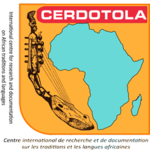
The international day of archives consecrated by the International Council of Archives (ICA) is the appropriate occasion to appreciate the importance of archives in the building up of societies’ historic, cultural and institutional memory. Under the thematic of “archives, citizenship and inter-culturalism”, this day allows us to re-examine the role of CERDOTOLA in the building up and value of African oral heritage.
The questioning on the value of oral archives obliges us for a moment to recall the context and the historic truths of Africa, particularly the place of orality in African traditions. Until recently, orality held an exceptional dimension because of the rarity and the late presence of writing in African realities. African storytellers were responsible for the spread, life, integrity and authenticity of orality. This cultural heritage now lacks of interest, representativeness, quantifiability, subjectivity and even of source. On the other hand, the legal uncertainties, the doubt around writing sources and the fact they are still unknown reduce the influence that archives might have on specialist and the general public.
The name “oral archives” potentially covers a wide range of documents that make its understanding and clearness more complicated. It is only in 1970 that some attempts of definition have appeared and in 1978, D. Aron-Schnapper and D. Hanet précised that: “building up oral archives does not only consist in gathering existing document (the work of an archivist) or working as a historian (the person who analyses and interprets) but consist in elaborating oral documents (even if they are transcribed, they keep their oral forms) in order to replace or complete non-existent or incomplete writings”. As a result there is a perspective of building up and value of that oral heritage. CERDOTOLA has quickly become famous by its commitment in this approach through the project ALORA (Archives of languages and Oral Resources of Africa) which is an open platform of diffusion of oral archives. This collective project that combines web technologies with recent innovations has as ambition to bring out the African cultural heritage from isolation and misreading. It means to give back to the wide public all the richness of oral archives but also use them as essence of scientific researches in Africa and even beyond. This institution that has been working since 40 years for the influence of Africa through its traditions and languages, takes advantage of this international day of archives to reaffirm it positioning in this approach of value of oral archives.

